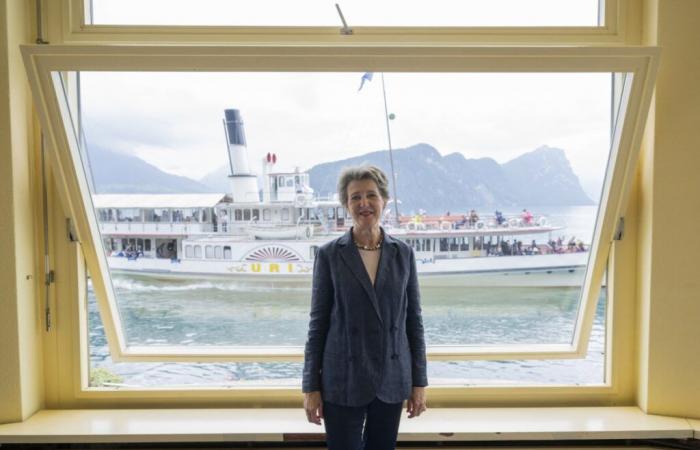Keystone / Urs Flueeler
Former Federal Councilor Simonetta Sommaruga (64) was involved in consumer protection from 1993 to 2010, first as director, then as president of the Consumer Protection Foundation (SKS – Foundation for Consumer Protection).
This content was published on
January 13, 2025 – 12:14
On the occasion of “50 years of consumer broadcasts on Swiss radio”, she looks back on this era and explains in particular where she still believes that a gap must be made up today in terms of customer protection.
SRF-“Espresso”: Simonetta Sommaruga, when we contacted you for this interview, you wrote to us that “Espresso” had been decisive for the rest of your professional and political career. What does this mean in practice?
Simonetta Sommaruga: “Espresso” was already a popular show at the time. It dealt with everyday issues that concerned consumers, and I was able to come and defend their interests. I was able to speak frankly and even, sometimes, shake up the Federal Council.
After the dioxin scandal in chicken feed in Belgium in 1999, you made a determined commitment to better declaration of origin of food. Has your work paid off?
I actually think that foods are better declared today. But it took time to impose it. We not only fought for the declaration of origin, but also for better information on the breeding conditions of the animals. There too, unfortunately, there had to be a scandal.
“I actually think that food is better declared today. »
Simonetta Sommaruga, former federal councilor
Suddenly we realized what it really meant for chickens to be raised on the ground, and we wanted to buy free-range products.
It also took a lot of effort for producers and businesses to offer a truly organic product when an organic label appeared on the packaging. Even today, they must be closely monitored to ensure that the provisions are respected.
From online shopping to cybercrime, everything related to the internet has become a major issue for today’s consumers. Are people well protected?
For years now, for example, there has been a right of withdrawal for online purchases in the European Union. Consumer protection has been trying to introduce such a right in Switzerland for years as well.
Recently, the Federal Council again rejected this idea. I see no reason why Swiss customers should be worse off than those abroad.
Is consumer protection having difficulty establishing itself in politics in our country?
Yes, I have the feeling that many politicians still think that people who get scammed only have themselves to blame. Those who suffer from it are also often those who are already on a financial tightrope.
I am thinking, for example, of consumer credit. They often lead to over-indebtedness because no one is really watching. This area is also less well regulated in Switzerland than in the EU. This too, I have difficulty understanding.
But we can still expect people to show a little personal responsibility, for example by checking the reviews of an online store before shopping there.
Of course yes. But we must then ensure that an evaluation or a comparison site is truly neutral.
And despite all the individual responsibility, we need shows, magazines and consumer defense organizations to inform people and make abuses public. Like for example the report on salmon battery farms before Christmas on the “Kassensturz” program.
Translated from German using DeepL by Emilie Ridard/ptur






